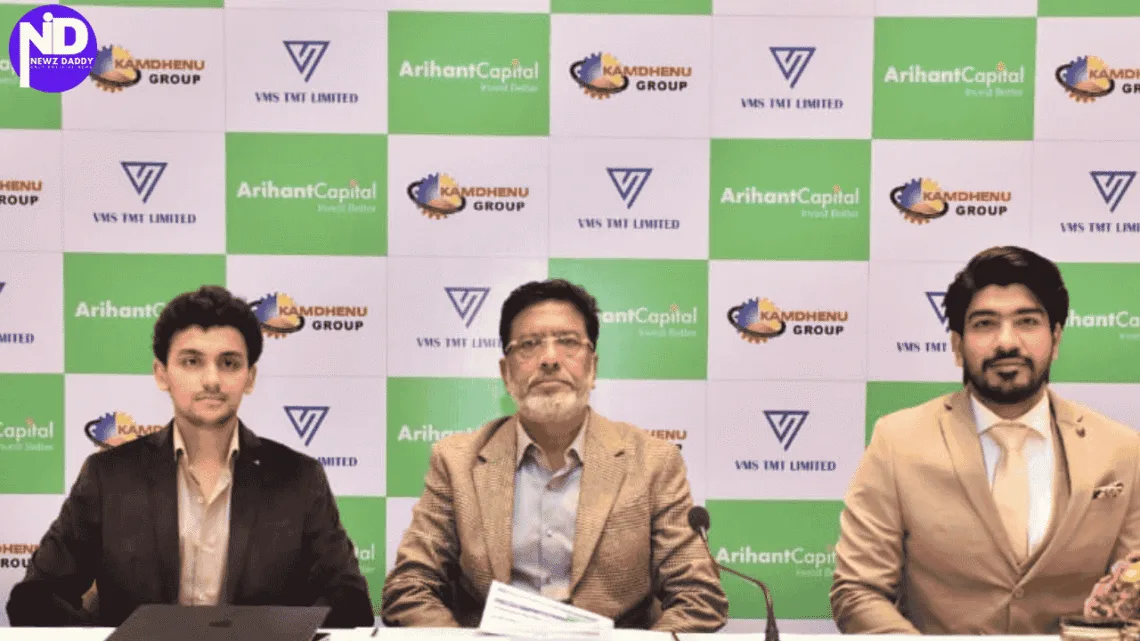VMS TMT IPO Launched With Strong Growth And Solar Plan
Newzdaddy Business Updates
Total annual installed capacity of TMT Bars is 200,000 metric tonnes (“MT”) per annum. The TMT (thermo-mechanically treated) steel bar market in India is growing steadily. Globally, TMT steel bar demand is expected to grow at about 9-10% per year from 2025 to 2032. In India, consumption of TMT bars has been rising due to infrastructure growth, affordable housing schemes, and urbanisation. For example, India consumed around 50 million tonnes in fiscal 2023.
Serve a diverse customer base comprising both retail and institutional customers. Institutional demand comes mostly from infrastructure and real estate, which have longer order cycles and bulk volumes. Retail customers are smaller builders or individuals buying smaller quantities. This mix helps a company reduce risk: when one part slows down, the other may still support revenue. Delivery logistics matter a lot in reaching retail customers, especially in Tier II/III cities. Having dealer/distributor networks plus own trucks lowers delays and improves trust.
VMS TMT Limited (“Company”), a Gujarat-based manufacturer of TMT Bars marketed under the Kamdhenu brand, today announced the price band of ₹ 94 – ₹ 99 per equity share for its forthcoming initial public offering (IPO). The Issue will open for subscription on Wednesday, September 17, 2025 and will close on Friday, September 19, 2025. The anchor investor bidding will open on Tuesday, September 16, 2025.
A price band of ₹ 94-99 per share means that investors will bid in that range, and the final allotment price will lie somewhere in between, depending on demand. Anchor investors are big investors chosen before public subscription. Their participation gives some confidence to smaller investors. The IPO will be listed on BSE and NSE. Arihant Capital Markets Ltd is the Book Running Lead Manager (BRLM) to the Issue, while Kfin Technologies Ltd is the Registrar to the Issue. NSE and BSE are major stock exchanges in India; listing on both gives better reach and liquidity. The Book Running Lead Manager handles the IPO process (pricing, allotment, marketing). Registrar handles paperwork, allotment, and investor records.
The IPO comprises a fresh issue of up to 1,50,00,000 equity shares of face value ₹10/- each through the book-building process.“Fresh issue” means new shares are issued, so the company raises new capital rather than selling existing shares. Book-building helps determine what the market is willing to pay; bids are collected from institutional and retail investors.
VMS TMT Limited intends to utilise ₹ 11,500.00 lakhs of the IPO proceeds for repayment/ prepayment, in full or part, of all or a portion of certain borrowings availed by the Company, while the remaining funds will be used for general corporate purposes and issue expenses. Using proceeds to repay debt can lower the interest burden and improve cash flow. That may help profitability.“General corporate purposes” could include expanding production, buying raw materials, or other business needs. The Gujarat-based company is engaged in the production of TMT bars at the manufacturing facility situated at Bhayla Village, Ahmedabad, Gujarat, India. Gujarat is a big hub for steel and related industries, with good infrastructure (ports, roads, power). That helps with the supply of raw materials and transport of finished goods.
The company have a distribution network, on a non-exclusive basis, comprising 3 distributors and 227 dealers as of July 31, 2025 and has more than 50 trucks that enable doorstep delivery of TMT bars to our retail customers. The focus for sales of the Company has been on Tier II and Tier III cities. The Company is backwards integrated with in-house billet production capacity of 2,16,000 MTPA and is also setting up a 15 MW solar power plant for captive consumption. Additionally, the Company is certified with BIS, ISO 9001:2015, ISO 45001:2018, and ISO 14001:2015 standards, highlighting its commitment to quality, safety, and environmental responsibility.
Backwards integration (making billets in-house) reduces dependency on external suppliers, helps cost control, and ensures better quality. Research point: Using solar power (15 MW) helps reduce electricity cost and carbon footprint. Certifications like ISO 14001 (environmental), ISO 45001 (health & safety), and ISO 9001 (quality) build trust among customers and regulators.
VMS TMT’s revenue from operations for the Fiscal 2025 stood at ₹ 77,019.10 Lakhs. Profit after tax improved from ₹ 1346.84 Lakhs in Fiscal 2024 to ₹ 1473.70 Lakhs in Fiscal 2025. A rising profit after tax means margin improvement or better cost control. Investors often look for consistent profit growth. Revenue of ~₹ 770 crores shows scale, but profit is modest compared to revenue. Margins in the steel/TMT bar business are often tight because raw material and energy costs are high.
For the three months ended June 30, 2025, revenue from operations and Profit after tax stood at ₹ 21,225.92 Lakhs and ₹ 857.64 Lakhs, respectively. Quarter-on-quarter or recent period numbers give a snapshot of how the business is doing now, which could be more relevant than older data. If profit in one quarter is high relative to the past quarter, it means demand, price or cost factors have improved. But steel markets are volatile, so recent quarters matter.
Must Read:
Adani Power 1600 MW: What It Means For Your Electricity Bill






